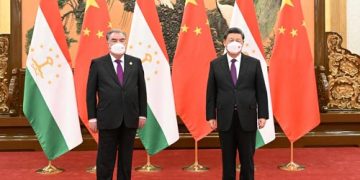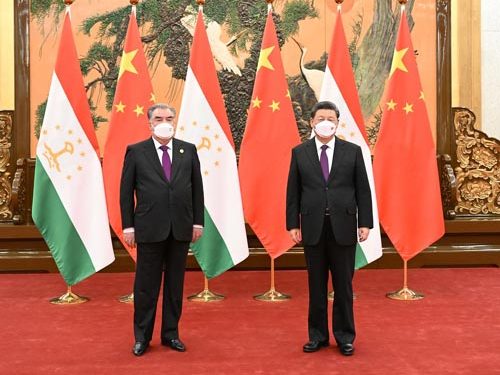Kabar
Tajik resident Emomali Rahmon on February 5 met in Beijing with the President of the People’s Republic of China Xi Jinping on the sidelines of the opening ceremony of the Winter Olympic Games, ASIA-Plus reported.
The parties discussed a wide range of issues related to the bilateral of cooperation between their countries, according to Tajik president’s official website.
Recalling the 30-year history of diplomatic relations between the two countries, President Emomali Rahmon reportedly expressed satisfaction with the relations of good neighborliness and friendship, and mutual trust of strategic partnership.
Rahmon and Xi, in particular, discussed prospects of further expansion of trade and economic cooperation between the two countries.
Interest was reportedly expressed in importing new technologies and creating the basis for the production of “green technology” in Tajikistan, in particular, electric vehicles, solar panels, building and equipping energy facilities in Tajikistan with advanced technologies.
The parties also touched upon the issues of expanding cooperation in the field of agriculture, increasing the volume of exports, primarily of Tajikistan’s environmentally friendly agricultural products to China, and further expanding collaboration in the transport and logistics sectors.
It was emphasized that the instrumental factors in promoting mutually beneficial relations between the two countries are the meeting of business groups of Tajikistan and China to attract investment, relations within the framework of the One Belt One Road Initiative and the development of new industrial, energy, transport and agricultural projects. Another important area of partnership between the two countries was the expansion of cooperation in the cultural and humanitarian sphere, in education and healthcare. Tajik leader expressed gratitude to the Chinese side for providing material assistance in the form of a vaccine against coronavirus during the pandemic. Upon the discussion of the topic related to security, the attention of the parties was directed to the issues of combating terrorism, extremism, separatism, transnational organized crime, drug trafficking and cybercrime, as well as the socio-economic situation in neighboring Afghanistan.





